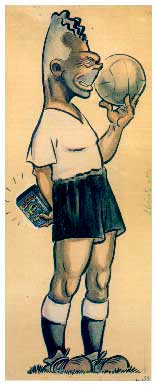Julio Emilio Suarez Sedraschi was one of the pioneers of comics in Uruguay, best-known for creating 'Peloduro' (1933). An artist, caricaturist, painter, radio broadcaster, teacher and journalist, Suarez was a prominent figure in the Uruguayan media. Suarez mostly signed with J.E. Suarez, but also with JESS, Marcos Tuáin, Pepe Repepe and El Mono. He is also known as Pelo and Peloduro, as his friends called him in a reference to his comic hero.
Early life and career
Julio Emilio Suarez was born in 1909 in the capital city of the Salto Department in northwestern Uruguay. Suarez studied architecture in Montevideo in 1927. He began his career publishing parliamentary notes in Carlos Quijano's short-lived daily El Nacional. The cartoonist published his first drawings in El Plata (the feature 'Wing y Roncadera'), before in 1934 his association with the magazine Mundo Uruguayo took off. He served as managing editor and created two cartoon features for this magazine, 'Ríase o no' ("Laugh or not") and 'Contra-refranes' ("Contradictions"). Suarez remained a contributor until 1950.
Peloduro
As in many countries, a comics movement arises from political satire, and it was Suarez's comic 'Peloduro' that paved the way. Published from 15 January 1933 in the daily El País, 'Peloduro' stars a boy from the working class with an eye for false political and social positions. From 24 September 1935, the feature was continued in El Diario, and it also ran in La Mañana, El Nacional, El Popular, Marcha, Época and Justicia. Peloduro was also the title of a weekly humor magazine, which Suarez published and edited, with intervals, between 1943 and 1964.
Cocona en el País de las Hormigas
In 1938, Suarez created the classic children's comic 'Cocona en el País de las Hormigas' in tribute to his daughter Alicia.
Cover illustrations for Peloduro issue #15 (6 November 1946) and #20 (6 October 1948).
Radio career
Apart from drawing cartoons, Suarez wrote scripts starring the 'Peloduro' character for the radio station CX24 from Montevideo. He was also the creator of the radio character Marieta Caramba, voiced by actrice Jebele Sand and broadcast daily on CX30 Radio Nacional. Suarez also worked as a drawing teacher at the School of Applied Arts, founded in 1946 by Emilio Cortinas and Walter Pérez.
Recognition
In 1941, Suarez received the prize of the Municipal Commission of Culture for his cartoons. The same year, he also won a second prize for his design of a carnival poster.
Death and legacy
Julio E. Suarez passed away in 1965 at the age of 59. His legacy has been honored on several occasions since then. A book was published about his life and work in 1996, a street was named after him in Montevideo and the Lolita Rubian Foundation introduced the "Peloduro" medal in 2000, and the Peloduro International Award for Graphic Humor in 2002.
Drawing by Julio Suarez.






